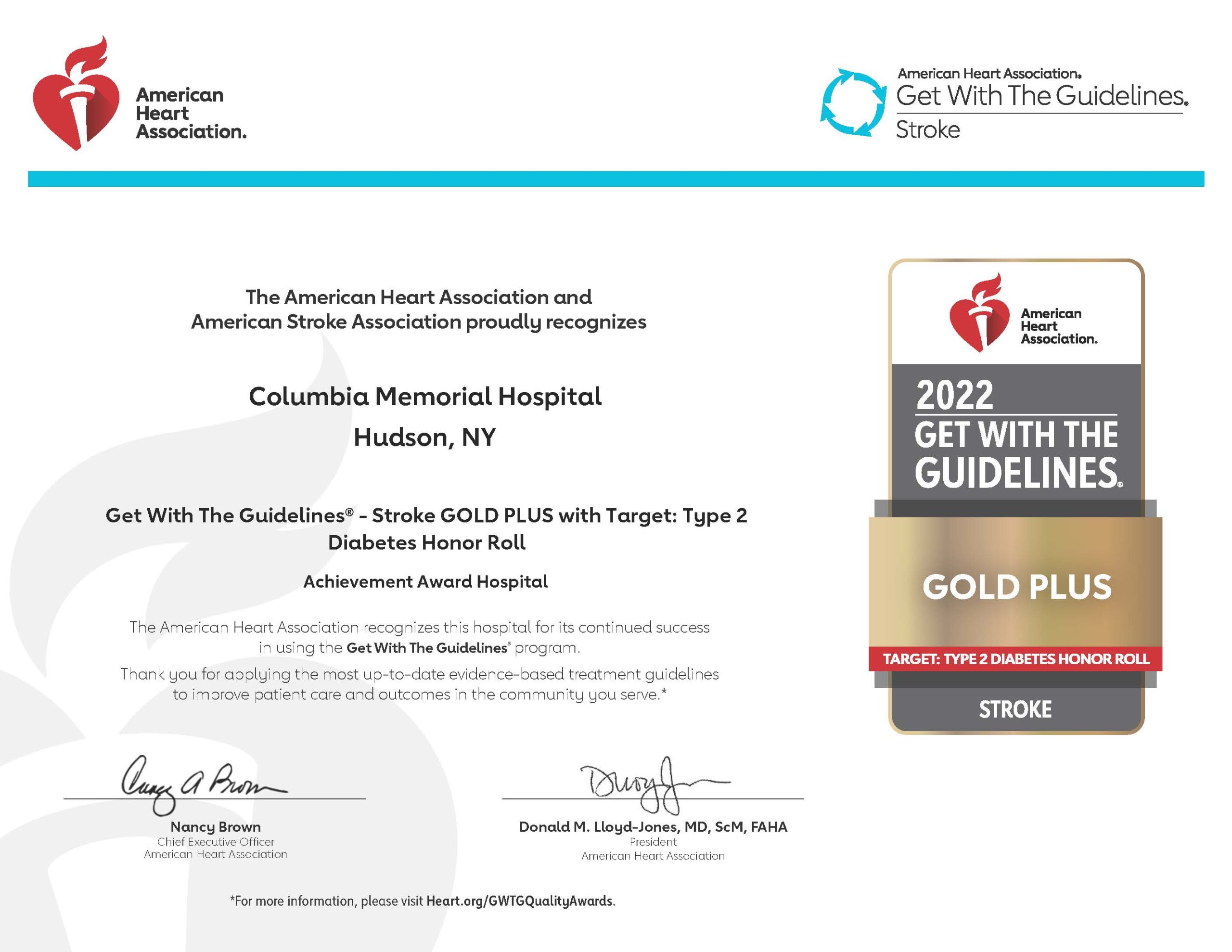STROKE CARE AT CMH
Columbia Memorial Health wins fifth consecutive top award from the
American Heart Association/American Stroke Association.

For the fifth straight year, Columbia Memorial Health has been recognized for its outstanding stroke care program, receiving the American Heart Association (AHA)/American Stroke Association’s (ASA) Get With The Guidelines®-Stroke Gold Plus Quality Achievement Award.
The AHA/ASA stroke award recognizes CMH’s excellence in providing stroke patients with the most appropriate treatment aligned with nationally recognized, evidenced based guidelines. The Gold Plus award, the highest level possible, is an advanced level of recognition acknowledging select hospitals for consistent high level performance across a broad range of stroke care quality measures.
In addition, CMH’s diabetes care program was recognized by being placed on the AHA’s Target: Type-2 Diabetes Honor Roll. This award is a distinguished honor for hospitals engaging in advanced care for patients with heart failure and/or stroke and type 2 diabetes. Honor Roll hospitals must meet a series of very stringent, evidenced based care standards to be recognized.
Columbia Memorial Health Chief Medical Officer Clifford Belden, M.D., said: “It takes a great deal of commitment, discipline and expertise across our entire treatment team to achieve and maintain the high clinical care standards necessary to earn these awards. It’s a matter of pride for all of us, and it’s a level of care we will keep working to continually improve.”
Michael Weisberg, M.D., Chief of Emergency Medicine at CMH, said: “Time and expertise matter most when it comes to treating stroke. Earning this award for the fourth consecutive year means that our community can feel extremely confident about the quality and effectiveness of the stroke care we deliver close to home at the CMH Emergency Department.”
According to the American Heart Association/American Stroke Association, stroke is the fifth leading cause of death and a leading cause of adult disability in the United States. On average, someone in the U.S. suffers a stroke every 40 seconds, and nearly 800,000 people suffer a new or recurrent stroke each year nationally.
Research has shown that hospitals adhering to clinical measures through the Get With The Guidelines quality improvement initiative often see fewer readmissions and lower mortality rates.
What You Should Know
What is a Stroke?
A stroke occurs when a blood vessel that carries oxygen to the brain is either blocked by a clot or ruptures. When that happens, part of the brain cannot get the blood (and oxygen) it needs, which causes brain cells to die.
What are the types of stroke?
• Ischemic Stroke is caused by a clot obstructing the flow of the blood to the brain.
• Hemorrhagic Stroke is when a blood vessel ruptures and prevents blood flow to the brain.
• Transient Ischemic Attack (TIA) is known as a mini stroke and is caused by a temporary clot.
Symptoms of stroke in Women and Men
• Numbness or weakness in face, arm or leg
• Trouble speaking or understanding speech
• Vision problems
• Trouble walking or a lack of coordination
• Severe headache without a known cause
• General weakness
• Disorientation and confusion or memory problems
• Fatigue
• Nausea or vomiting
Prevention of Heart Attack and Stroke
1. Stop smoking
2. Engage in physical activity
3. Use diet therapy
4. Maintain/reduce weight
5. Control blood pressure
6. Undergo cholesterol control/statin therapy
7. Control blood sugar
8. Limit alcohol intake
If you are experiencing symptoms of a stroke, please call 911 or come to the CMH Emergency Department.

